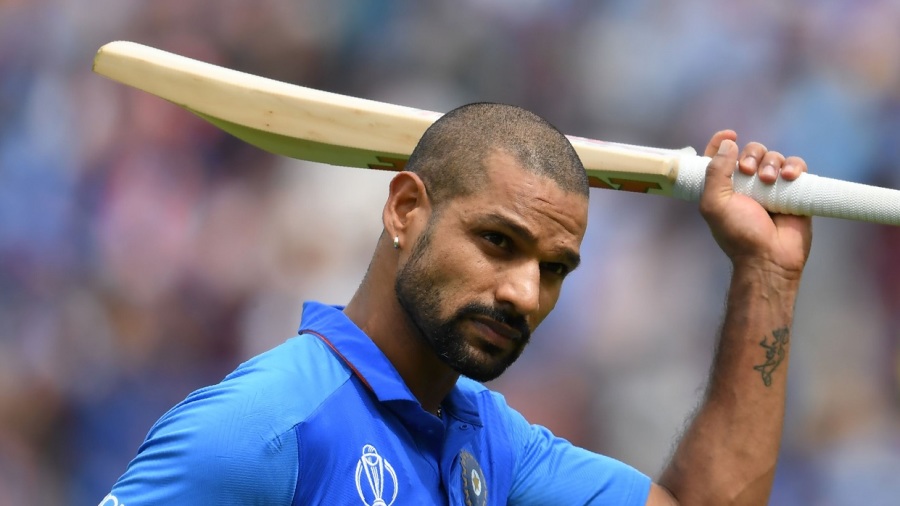India 352 for 5 (Dhawan 117, Kohli 82, Rohit 57, Hardik 48, Cummins 1-55) beat Australia 316 (Smith 69, Warner 56, Carey 55*, Bhuvneshwar 3-50) by 36 runs
As it happened
There was a masterclass in batting at The Oval. Shikhar Dhawan overcame a weakness to score 117. Steven Smith showed none as he made 69. Hardik Pandya was pure unfettered power. David Warner fought demons. And Virat Kohli, as always, was method over madness.
That the Oval pitch offered nothing to the bowlers dulled the contest a little bit, but India showed immense awareness with the way they paced their innings and for that alone they deserved victory.
There was no inkling at the start of the day that Australia would concede 352 – a new low for them in the World Cup.
Mitchell Starc and Pat Cummins understood that there wasn’t any help for them and so were quick to pull their lengths back and keep a tight line around the off stump, and occasionally resorted to cross-seamers, bouncers and yorkers to surprise the batsmen.
For the first seven overs, Dhawan and Rohit Sharma sauntered along at 3.14 per over. Then came Nathan Coulter-Nile. And three boundaries in six balls. India’s victory is owed entirely to their batsmen recognising moments like these. They were like the muscle car revving up in front of the stop light.
Dhawan, especially. He had a big bulls-eye on him. A weakness against left-arm pace. And he’d have to deal with one of the best exponents of it in recent times. He’d been lbw to Trent Boult and Mustafizur Rahman in the warm-up games because of his front foot going too far across, but here a simple change – batting on leg stump, and even occasionally outside – helped him stay beside the ball and survive Starc’s menace.
There were other obstacles in his way. Namely Cummins. The right-arm quick hurt Dhawan’s left thumb with a bouncer and the batsman kept yanking his bottom hand off his bat every time he was forced to drive. The physio’s magic spray helped but to play through pain for nearly three hours – he didn’t come out to field in the second innings – was a monumental effort. And it came with a fitting reward. A sixth century in ICC tournaments. Of all batsmen from anywhere, only Sourav Ganguly and Sachin Tendulkar have more.
India did a great many good things in this game. They identified Australia’s fifth bowler (Marcus Stoinis) and their lead spinner (Adam Zampa) as weaknesses and carted them for 112 runs in 13 overs. A lot of that was Hardik’s doing. The score read 220 for 2 when he walked out in the 37th over and the fifth ball he faced went to the boundary. Later, he hit a straight drive so hard that the bowler Coulter-Nile just ducked. It came back to him in the air and cricketers are supposed to catch those but human beings tend not to want their heads knocked off by a piece of leather.
ESPNcriinfo’s Forecaster had India reaching 332 at the halfway stage of their innings. Hardik’s 48 off 27 balls straight up lol-ed at data analytics.
Amid all this, Kohli scored 82 off 77 balls, his 50th ODI fifty. It was actually a bit of a scratchy innings. His most eye-catching moment was actually when he went up to the Indian fans in the crowd and told them off for calling Smith a “cheater”.
The former Australia captain wasn’t around when they won the ODI series in India three months ago and kickstarted a 10-match winning streak, and he was in the mood to make up for lost time. His footwork, especially against spin, was both instinctive and precise. And even when he found himself in a tangle, like when Chahal surprised him with a dipping yorker or Hardik with an lbw-written-all-over-it low full toss – his hands somehow placed the bat at exactly the place it needed to be.
Smith made 69, looking in perfect control. Warner, though, looked every bit a batsman still getting used to the rigours of international cricket again. He could have been bowled by Bumrah’s first ball if the zing bails had worked, and went on to play as many as 48 dots. The man’s capable of scoring Test centuries in that time but here he just couldn’t line up India’s bowlers.
Bhuvneshwar Kumar was the one responsible for that. His control – bowling back of a length but never giving the left-hander room to cut or pull – meant Australia couldn’t get the kind of rapid start that might have made this more of a contest. And when it was threatening to be one as Smith and Glenn Maxwell put on a rip-roaring partnership, he came back to pick up two wickets in two balls in the 40th over to essentially kill the game. Alex Carey whacked the fastest fifty by an Australian in World Cup cricket, but even that couldn’t make up for the early damage.
There was debate before the World Cup about Bhuvneshwar’s place in the XI because he doesn’t always bowl upwards of 140 kph and because the white ball doesn’t swing very much. But his value as a death bowler should not be underestimated. Not only does he have the variations necessary – yorkers, bouncers, slower balls – he knows exactly when to use what. To go at five an over and pick up three wickets in a game that yielded 668 runs was sublime work.

